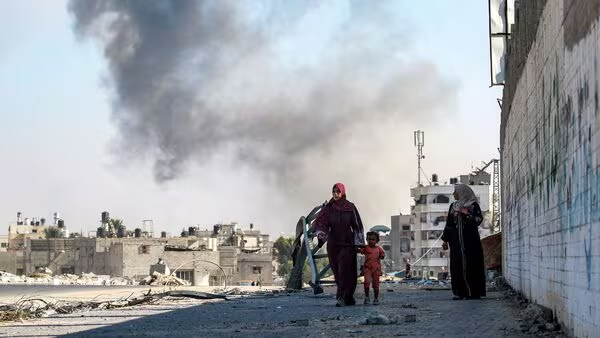
Syrian security source says Israeli ‘aggression’, launched from Lebanese airspace, targeted military instalments.
Israeli missiles have killed at least 14 people in central Syria, state media outlets have reported.
The attack on Sunday night sparked a fire and caused material damage near the city of Masyaf, in the Hama province, according to SANA, Syria’s official news agency. The update, which also reported 43 injured, raises the toll of five dead and 19 wounded reported earlier.
“At around 23:20 on Sunday evening, the Israeli enemy launched an air aggression from the direction of northwestern Lebanon, targeting a number of military sites in the central region [of Syria],” a military source told the SANA news agency.
“Our air defence systems confronted the aggression’s missiles and shot down some of them,” the source added, without providing further details.
The Israeli military commonly does not comment on its operations in Syria.
Two regional intelligence sources said a major military research centre for chemical arms production located near Masyaf had been hit several times, Reuters reported. A team of Iranian military experts involved in weapons production was believed to be working at the site, the news agency added.
A local health official quoted by SANA said 43 people had been injured, including several critically, in the strikes.
The director of the public hospital in Masyaf said the casualties were civilians.
‘Harsh punishment’
Israeli jets have often launched attacks against Syria from Lebanon, likely in a bid to avoid Syrian airspace where multiple regional and international forces, including those of Russia and the United States, operate.
Throughout Syria’s 13-year civil war, Israel has regularly carried out air raids in the country – mostly targeting Iran-linked sites.
Sunday’s attack comes amid growing regional tensions, with Iranian officials still pledging to respond to the assassination of Hamas chief Ismail Haniyeh in Tehran in July.
Iran, which maintains a military presence in Syria, had promised “harsh punishment” for Israel over the killing, but no Iranian attack has materialised more than 40 days after the assassination.

Last week, Mohsen Chizari, a top Islamic Revolutionary Guard Corps (IRGC) commander, said Iran’s response is coming “in due time”.
Iran launched a direct attack on Israel with hundreds of drones and missiles in April in response to the Israeli bombing of an Iranian diplomatic facility in Damascus.
Israeli and US air defences in the region helped shoot down most of the projectiles, minimising the damage of the attack.
Separately, Hezbollah carried out its own attack against Israel on August 25, responding to the killing of one of its top commanders in an Israeli air raid in Beirut which also killed several civilians.
Israel had said that it thwarted the operation with a preemptive attack, but the Iran-allied Lebanese group said it successfully hit an Israeli military intelligence site near Tel Aviv.
Cross-border hostilities between Hezbollah and Israel have continued on a near daily basis. Hezbollah says it is targeting military sites in northern Israel and Syria’s occupied Golan Heights in support of Palestinians in Gaza, where the ongoing Israeli offensive has killed more than 40,900 people.
The Lebanese group has promised to continue its military operations until the war on Gaza ends, while Israeli officials have promised to push Hezbollah off the country’s border, including by all-out war if necessary.





